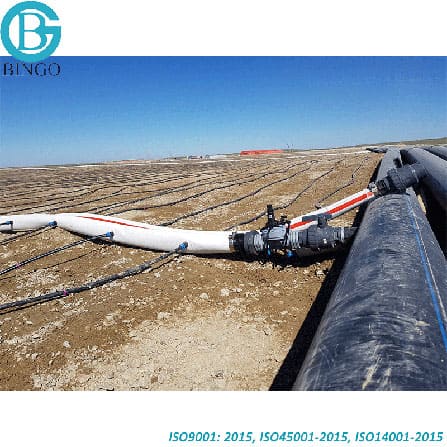Comprehending the Secret Benefits of HDPE Pipeline for Water and Wastewater Administration
Using HDPE pipeline in water and wastewater administration offers many advantages that warrant factor to consider. Its outstanding longevity and lengthy life expectancy make it a favored choice for several tasks. In addition, the product's resistance to corrosion and chemical damage enhances its integrity in numerous settings. Nonetheless, the advantages prolong past just durability and resistance. Exploring its cost-effectiveness and environmental influence reveals even more engaging reasons for its widespread adoption in modern-day infrastructure
Phenomenal Sturdiness and Longevity

HDPE pipe stands apart for its outstanding sturdiness and durability, making it a favored choice in water monitoring systems. Built from high-density polyethylene, these pipes can stand up to significant stress and stress and anxiety, making certain trustworthy performance in time. Their durable nature enables them to endure severe environmental problems, consisting of temperature variations and dirt motions, which can cause various other materials to stop working.
The life expectancy of HDPE pipelines usually goes beyond 50 years, supplying an affordable service for municipalities and sectors alike. Furthermore, the product's lightweight residential or commercial properties simplify installation, reducing labor expenses and timeframes. This toughness reduces the requirement for regular repair services or replacements, further boosting its financial allure.
In water monitoring applications, the integrity of HDPE pipes means fewer disruptions and improved solution continuity, making them integral to lasting framework growth. The combination of resilience and durability strengthens HDPE's duty as a keystone in efficient water monitoring remedies.

Resistance to Deterioration and Chemical Damage
While many materials catch rust and chemical damages over time, HDPE pipelines exhibit remarkable resistance, making them perfect for different water administration applications. This resilience originates from the molecular structure of high-density polyethylene, which is naturally non-reactive and does not corrode like steels or degrade from direct exposure to harsh chemicals. Therefore, HDPE is very reliable in environments with hostile substances, such as wastewater systems that may contain acids, bases, and organic solvents.
In addition, HDPE pipes can withstand environmental elements such as soil acidity and saline conditions, further enhancing their viability for diverse applications (Pipe Supplier American Plastics Midland). Their capability to keep structural honesty over time reduces the danger of leakages and failures, which is crucial in making certain the safety and security and dependability of water distribution and wastewater management systems. Subsequently, the resistance to corrosion and chemical damage considerably contributes to the general efficiency and longevity of HDPE piping remedies
Cost-Effectiveness and Economic Benefits
When considering the monetary implications of water monitoring systems, the cost-effectiveness of HDPE pipelines becomes obvious. These pipes provide reduced setup and upkeep costs contrasted to standard materials like metal or concrete. Their lightweight nature streamlines transportation and installation, causing lowered labor costs. In addition, HDPE pipes show a long life expectancy, usually exceeding 50 years, which converts to fewer replacements and lasting savings.
The resistance of HDPE to corrosion and chemical damages decreases the demand for pricey repair services and replacements. The pipes additionally sustain efficient water circulation, decreasing energy costs related to pumping systems. By mitigating leakages and water loss, HDPE pipes add to substantial financial advantages for towns and industries alike. On the whole, the preliminary investment in HDPE piping can yield substantial economic returns Full Report over the life-span of the water monitoring system, making it a prudent selection for sustainable facilities development.
Environmental Sustainability and Reduced Influence

Convenience and Adaptability in Setup
Due to their special residential or commercial properties, HDPE pipelines use exceptional flexibility and adaptability in installation, making them ideal for a vast array of applications. Their lightweight nature allows for simpler handling and transportation, minimizing labor prices and installment time. HDPE pipelines can be curved and shaped to fit numerous terrains and project needs, which is especially beneficial in testing settings.
Additionally, their resistance to deterioration and chemical damages permits setup in varied settings without the demand for specialized safety finishes. The ability to fuse joints produces a continuous, leak-free system, improving the overall stability and integrity of the installment. HDPE's versatility additionally suits ground movement, minimizing the danger of damage in locations vulnerable to changing dirt. On the whole, these characteristics make HDPE pipelines not only versatile yet additionally a preferred choice for water and wastewater administration systems.
Regularly Asked Inquiries
How Does HDPE Pipeline Compare to PVC in Water Administration Applications?
HDPE pipeline provides remarkable adaptability, resistance to rust, and resilience compared to PVC. Its lighter weight helps with less complicated installation, while its long lifespan minimizes replacement costs, making HDPE a preferred choice in water monitoring applications.
What Is the Life-span of HDPE Pipes Under Common Problems?
Under typical problems, HDPE pipes can have a life-span varying from 50 to 100 years. Their toughness and resistance to rust contribute to their long-lasting performance in various applications, making them a reputable selection for inch culvert pipe framework.
Are HDPE Pipeline Recyclable After Their Solution Life?
Yes, HDPE pipelines are recyclable after their solution life. American Plastics HDPE Pipe Manufacturing. They can be refined and repurposed into brand-new items, greatly minimizing ecological impact and promoting sustainability within the market, making them an environmentally friendly selection for piping remedies
What Is the Installation Process for HDPE Pipes?
The setup process for HDPE pipes includes website preparation, trenching, pipeline fusion or mechanical signing up with, backfilling, and pressure screening. Appropriate strategies assure a resilient and effective system for delivering water and wastewater successfully.
Can HDPE Water Lines Be Made Use Of for Both Drinkable and Non-Potable Water Systems?
Yes, HDPE pipes can be utilized for both safe and clean and non-potable water systems. Their adaptability, toughness, and resistance to corrosion make them suitable for various applications, guaranteeing safe and effective transportation of water in different contexts.